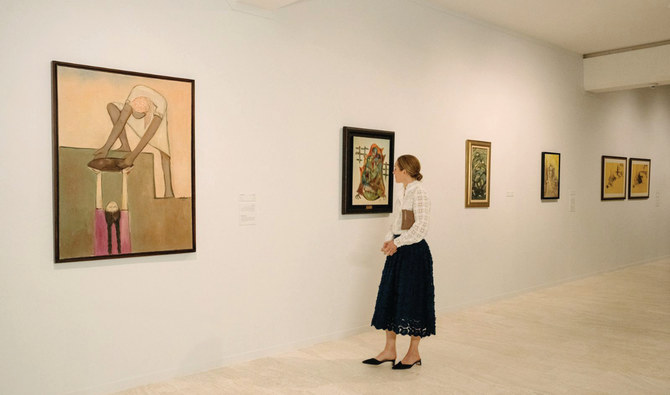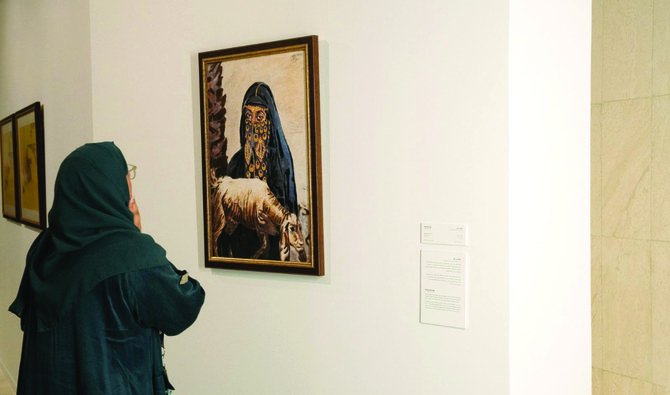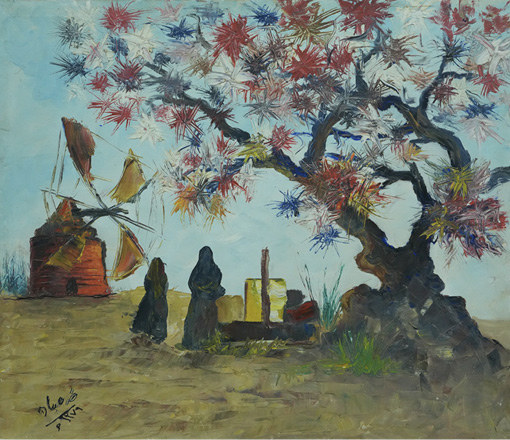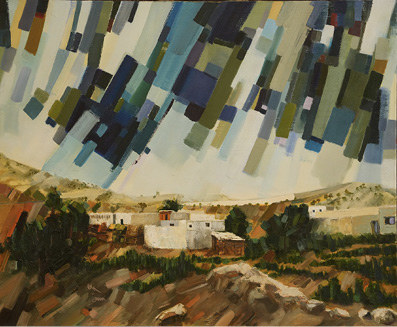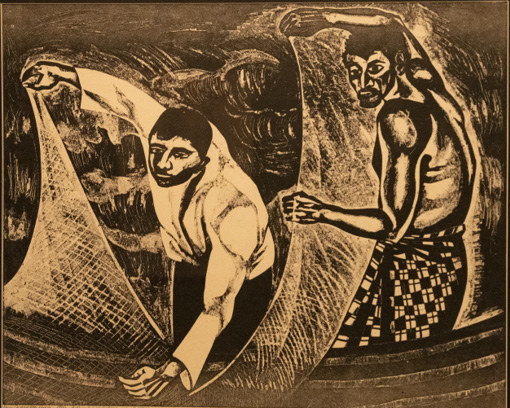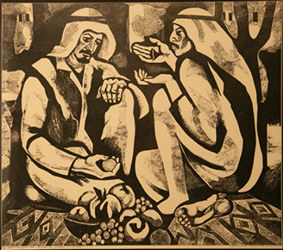RIYADH: Misk Art Institute’s new exhibition “Echoing the Land” brings together a collection of 55 pieces mirroring Saudi history through the eyes of 20 pioneering artists.
The exhibition is being showcased until Mar. 7 next year at the Prince Faisal bin Fahd Fine Arts Hall.
Curated by a team from the institute, the exhibition showcases works from the second half of the 20th century and reveals each artist’s educational journey, “highlighting a group of Saudi artists who contributed to shaping the identity of the local art movement.”
Yousef Jaha’s painting “Alhada Summer,” from 1974, tells a personal story of childhood memories with a group of friends camping in Taif, a city in Makkah Province.
Speaking about the work, Jaha said: “What you see here is a scenic view of Alhada, a place that is cool during the summer and winter. Being from Makkah, I would go out with a group of guy friends and camp in front of this exact scene.”
Jaha’s painting shows an abstract cloudy sky and muddy ground surrounding a realistically painted traditional folk house in the center, embraced by mountains.
He added: “We camped and we sat for two days. We would eat and drink in the tent; we would play football and cards. So, this scene was in front of me and I remember the rain fell, the wind was blowing, and it was very cold with bursts of wind.”
Jaha’s previous artworks included portraits, still life, and landscape paintings of Makkah.
His style has evolved to abstract expressionism, works with broad brushstrokes bursting with color.
It was that day in the summer of 1974 that Jaha felt moved by the view. He said: “I took my hand and quickly drew the scene without having a big canvas back then. It gave me a beautiful impression.”
Jaha said he felt a powerful rush of emotions from “the rainy nature that gave me the colors of the wet soil, the local house, the trees, the sheep’s house, the rocks in front of the building.”
Jaha later gathered his thoughts and tools and began painting on a bigger canvas.
He said: “Once upon a time, I used many colors until I created a painting that is close to the reality of what I saw, especially to the colors of the muddy soil.”
Jaha said that when he saw his painting again nearly 40 years later, he became emotional and nostalgic.
He said: “My eyes teared up. I got a lingering feeling and could not believe that I could ever have abandoned that view.”
Artworks featured in the exhibition range from natural landscapes and urban settings to traditional architecture and the intricacies of human connections within Saudi culture.
Abdulsattar Al-Mussa has three artworks featured in the exhibition which utilize a technique of engraving cardboard.
He said: “I studied art academically. I studied graphics, and I specialized in graphics and black and white.”
The first work, “Wedding in Alriffa 3/4,” from 1986, shows a traditional image of a father and a man discussing their children’s marriage.
The pieces “Fishermen 4/5” and “Fishermen 5/5,” both from 1987, were inspired by Al-Mussa’s grandfather who had a background in pearl fishing. Both the works depict Saudi men in traditional clothing fishing for pearls.
Al-Mussa was a graduate from Moscow’s Academy of Fine Arts, from where he obtained a bachelor’s and a master’s in graphics and composition.
He said his works “received great evaluation from the Russian artists present.”
Al-Mussa says he uses art as a means of self-expression.
He said: “I must continue to express everything I see … This artist addresses all topics, every sensitivity is addressed.”
He refers to his artworks as “children that I take time to work on, with small sketches, then the painting comes, and on to the next.”
“Landscape,” by artist Taha Al-Sabban, who was born in 1948, also features in the exhibition. The painting highlights elements of Al-Sabban’s life in the Kingdom, drawing inspiration from Hijazi culture, and his time abroad in Holland.
It shows a windmill and two veiled women standing under a tree covered with red, white, blue, and green leaves which reflect the flags of Saudi Arabia and the Netherlands.
The works on display were inspired by each artist’s experiences and reflect their perspectives on their surroundings while showcasing the illuminating diversity of the Kingdom’s splendor.
The exhibition is also playing host to a series of training courses and dialogue sessions.
The event results from the institute’s interest in documenting the first steps of the art scene in the Kingdom, and its role in contributing to awareness and encouraging the documentation process in the sector.
Misk Art Institute seeks to enrich artistic culture and support creative experiences by organizing events that connect artists to international schools, helping them to improve and market their work.
“Echoing the Land” can be accessed virtually through the institute’s website.


